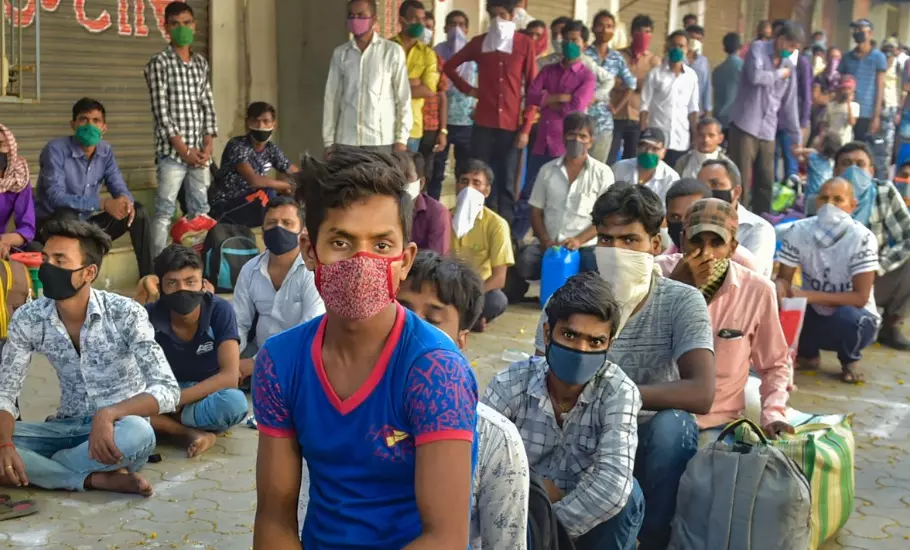
Punjab villages move against migrant workers after Hoshiarpur child’s murder
Sarpanches in Hoshiarpur pass resolutions barring migrants without valid documents; CM Bhagwant Mann warns such actions amount to discrimination

Following the gruesome murder of a five-year-old boy in Hoshiarpur, Punjab, on September 9, several village panchayats decided to stop attesting the documents of migrant labourers in their respective areas.
Several sarpanches resolved to not allow migrant labourers without valid documents to reside in their villages, even as Chief Minister Bhagwant Mann stated that there should not be any discrimination.
The body of a five-year-old boy, who was abducted while playing outside his house in Hoshiarpur on the evening of September 9, was found at a cremation ground in the city's Pur Hiran locality the next day. Police arrested Manke Yadav, a migrant labourer hailing from Uttar Pradesh and residing in the Subzi Mandi area, in connection with the incident.
They said the accused, an alleged alcoholic, had abducted the boy, sodomised him, and strangled him. The post-mortem report revealed multiple injuries on the child's body. The incident triggered widespread outrage in Hoshiarpur city and adjoining villages.
Also Read: Chained by debt: How migrant workers’ distress shadows Nuakhai in Odisha
Resolution on migrant labourers
The anger among residents intensified after images of the victim and details of the crime surfaced. Videos showing the boy's grieving family were widely circulated on social media, further fuelling the resentment.
Against this backdrop, sarpanches from around 20 villages, including Chak Sadhu, Nandan, Singhpur, Bassi Bahian, Dada, Kila Baroon, Allahabad, Bilaspur and Anandgarh, held a meeting in Bajwara on September 13.
They passed a resolution that panchayats would no longer attest the official documents of migrant labourers who did not possess valid identification papers from Punjab. They further decided that migrants without valid papers would not be allowed to reside in their respective villages.
The sarpanches also submitted a request to Hoshiarpur Deputy Commissioner Aashika Jain for full support from the district administration.
Also Read: Anti-Bangladeshi drive, Trump tariff: A double whammy for Bengali migrants in Gujarat
Concerns about migrants
Bajwara's sarpanch Rajesh Kumar Bobby Mahe said migrants without valid identity papers have been asked to vacate these villages.
"Those who have been living here for long and already possess documents such as Aadhaar or PAN have been clearly told that if any of their relatives arrive from outside, the panchayat will not verify their papers," he said.
The sarpanch added that migrant workers staying on rent could do so only if their landlords take full responsibility for them and submit a written undertaking to the panchayat.
Mahe claimed that 200-250 migrant labourers were currently living in Bajwara, many of whom have allegedly encroached upon panchayat land and constructed permanent houses, complete with electricity meters and water supply connections.
"They don't pay rent to the panchayat and have illegally occupied common land," he alleged, adding that a complaint regarding this was already submitted to the deputy commissioner on September 8.
Mahe said that around 25 panchayats in Hoshiarpur have passed resolutions to not verify documents of migrants in the aftermath of the September 9 incident. Similar resolutions were reported from Jaja and Zahura villages in the Tanda sub-division.
Also Read: Quarry collapse in Andhra Pradesh kills six migrant workers from Odisha
CM speaks against discrimination
Meanwhile, Chief Minister Bhagwant Mann, responding to reporters' questions in Chandigarh on the stand adopted by the village panchayats against migrants, said that there should be no discrimination against migrant workers.
Citing that, for instance, Punjabis have businesses in Chhattisgarh's Raipur, Mann said, "Tomorrow they could be sent out as well. There cannot be such discrimination."

